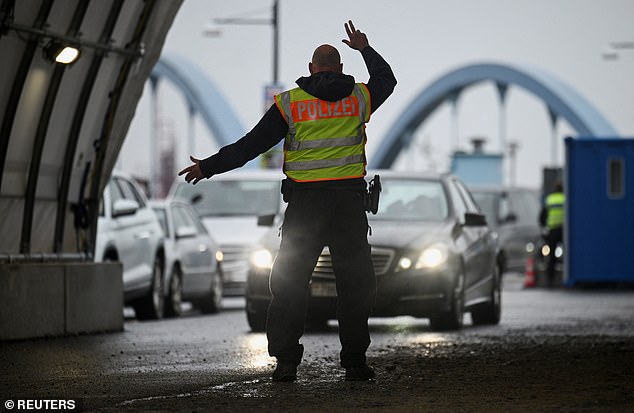Germany is today presenting its plan to end uncontrolled illegal immigration into the country with reinforced border controls on all nine of its borders.
The new controls will be in place for an initial period of six months and are expected to include temporary structures at land crossings and random checks by federal police.
The coalition government hopes to demonstrate its seriousness in efforts to tackle irregular migration following a series of Islamist attacks in recent months that have galvanized far-right groups.
Interior Minister Nancy Faeser insisted yesterday that the measure would help “put an end to criminals and identify and stop Islamists at an early stage.”
But the policy has not been without domestic criticism and risks fracturing Germany’s centre-left coalition and alienating its European neighbours.
Police control traffic on the German-Polish border as reinforced border controls are introduced
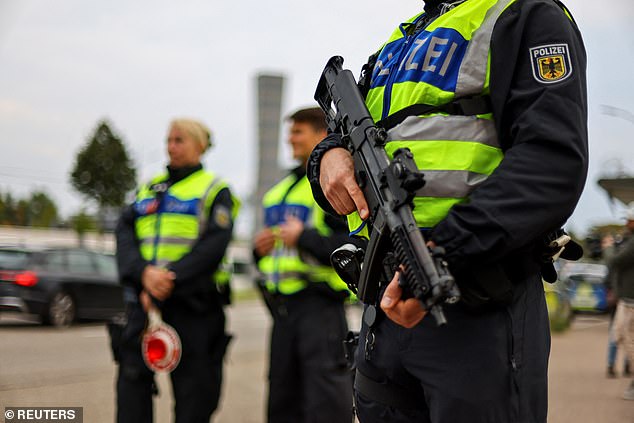
The controls will be carried out for an initial period of six months (pictured: Kehl, Germany, Monday)
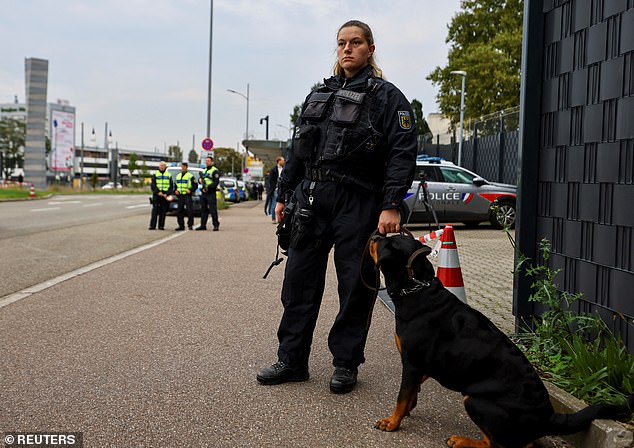
A German policeman stands guard with a dog at the border with France on Monday
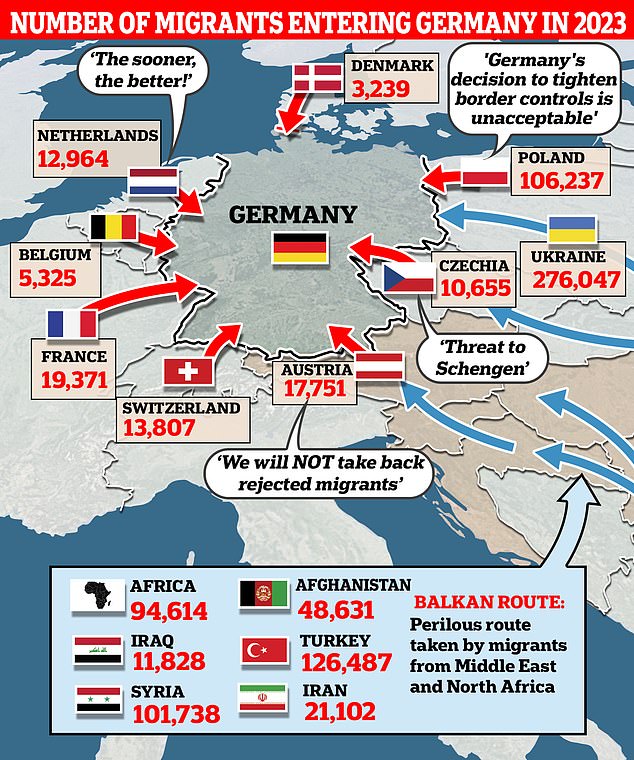
Poland and Austria are among neighbours to have expressed concern, while the European Commission has warned that members of the 27-nation bloc should only impose such measures in exceptional circumstances.
Germany is located in the heart of Europe and borders nine countries that are part of the visa-free Schengen zone, designed to allow the free movement of people and goods.
Border controls with Poland, the Czech Republic, Austria and Switzerland were already in place before the offensive was announced.
But now these measures will also be extended to Germany’s borders with France, Luxembourg, the Netherlands, Belgium and Denmark.
Faeser said the government hoped to minimise the impact on people living and working in border regions and promised “coordination with our neighbouring countries”.
However, the Interior Ministry said travelers must carry identification when crossing the border.
Although companies operating in the region have warned that reinforced border controls could have dire consequences.
Geert van Eijk, from the Evofenedex trade association, saying that the delays could cost “tens, perhaps even hundreds of millions of euros.”
In recent weeks, a series of extremist attacks have shocked Germany, fueling growing public anger.
Last month, a man stabbed three people to death and injured eight others at a festival in the western city of Solingen.
The Syrian suspect, who has alleged links to the Islamic State group, was due to be deported but managed to evade authorities.
The failure to enforce the law sparked a bitter debate that marked the run-up to two regional elections in the once-communist east, where the anti-immigration AfD party scored record results.
As national elections approach next year, Chancellor Olaf Scholz’s government has been under intense political pressure to toughen its stance toward migrants and asylum seekers.
Scholz was in Uzbekistan on Sunday to sign a migration agreement that will allow workers to come to Germany, while simplifying deportation procedures in the opposite direction so that “those who need to go back, go back,” the chancellor said.
Closer to home, the German government has unveiled plans to speed up deportations to European partners.
Under EU rules, asylum applications must be processed by the country of arrival. The system has put enormous pressure on countries on Europe’s periphery, whose leaders have called for greater burden-sharing.
Greek Prime Minister Kyriakos Mitsotakis said Germany’s tightening of borders means “basically passing the buck to countries on Europe’s external borders.”
Austrian Interior Minister Gerhard Karner said his country “will not accept people who are rejected by Germany,” while Polish Prime Minister Donald Tusk condemned Germany’s move as “unacceptable.”
Warsaw has also had problems with migration and has accused Moscow of smuggling people from Africa and the Middle East into Europe by sending them through Belarus to the Polish border.
Berlin said on Friday that Tusk and Scholz had discussed the issue and agreed to strengthen the EU’s external borders, “especially in view of the cynical instrumentalisation of migrants by Belarus”.
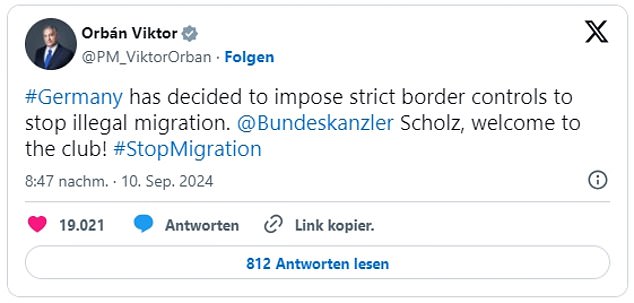
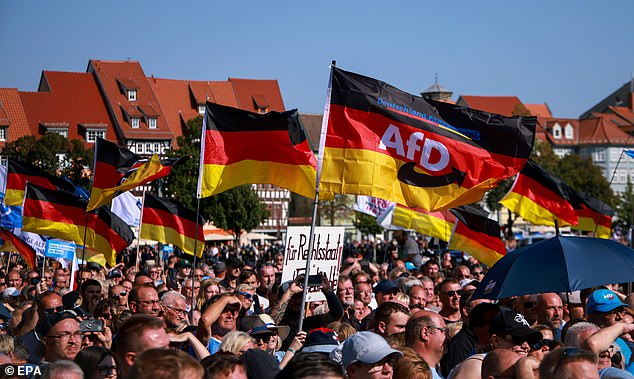
The far-right political party Alternative for Germany (AfD) has become the first of its kind to win in the country since World War II (file image, August 31)

A police officer checks vehicles near the Belgian border in Aachen on Monday.
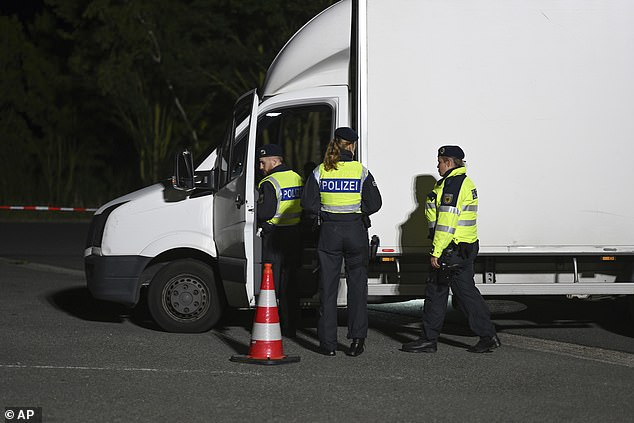
Police officers check a van at the Bunderneuland border crossing early Monday morning.
Meanwhile, Hungary’s nationalist Prime Minister Viktor Orban mocked the German chancellor on social media site X, writing: ‘Bundeskanzler Scholz, welcome to the club! #StopMigration.’
Germany took in more than a million asylum seekers between 2015 and 2016, many of them Syrians, and has taken in more than a million Ukrainians since the start of the Russian invasion in 2022.
The additional burden on municipal authorities and integration services in Germany must be “taken into account” when discussing new border controls, the Berlin Interior Ministry said.
In the Netherlands, Prime Minister Dick Schoof on Friday unveiled the country’s toughest migration policy yet, saying he would request an opt-out from the EU’s common asylum policy next week.
A four-party coalition dominated by far-right Geert Wilders’ Freedom Party wants to declare an “asylum crisis” to stem the flow of migrants through a set of strict rules including border controls.

